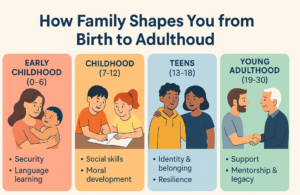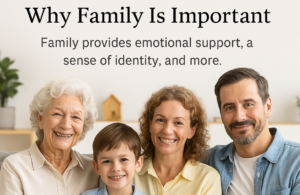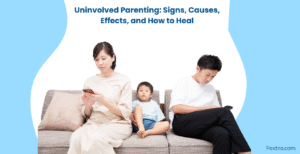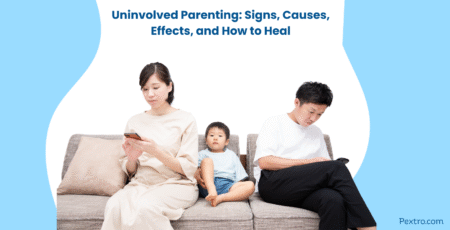Family is the foundation of our lives. It’s where we first feel love, learn values, and build lasting bonds. Whether it’s our parents, siblings, or chosen family, these relationships shape who we are and how we see the world.
Understanding the importance of family goes beyond tradition—it touches every part of our emotional, social, and personal growth. In this article, we’ll explore why family is important, how it supports us through life’s ups and downs, and the powerful role it plays in child development, identity, and well-being.
Defining Family in the Modern Context
The idea of family has evolved over time. While the traditional view often focused on the nuclear unit—parents and children—today, family can mean many things. It might include extended relatives, stepfamilies, or even close friends who feel like home. Some families are bound by blood, others by love and shared experiences.
1. Emotional & Psychological Benefits of Family
Family is our first emotional anchor. From the beginning, it offers the comfort, safety, and love we need to build confidence and trust in the world. Strong family bonds help us feel secure, valued, and understood. This kind of emotional support is essential for mental health and long-term happiness.
In tough times, knowing someone is there for us builds resilience and helps us cope better with stress. Simply put, a caring family doesn’t just make life easier—it makes us stronger, emotionally and psychologically.
2. Family as the Foundation for Values and Ethics
Our first lessons in right and wrong usually come from home. Through everyday actions, conversations, and discipline, family teaches us how to treat others and handle life. Parents and caregivers act as role models, helping shape our moral development from an early age.
Whether it’s honesty, kindness, or responsibility, these values become part of who we are. The role of family isn’t just about care—it’s about guiding us to become respectful, thoughtful, and grounded individuals.
3. Educational and Cognitive Development
Family plays a key role in how we learn and think. Long before school begins, children pick up language, problem-solving, and curiosity at home. A supportive family encourages asking questions, exploring ideas, and building confidence.
This early boost helps with cognitive development and sets the stage for lifelong learning. Families who value education often inspire kids to work hard, stay curious, and believe in themselves. In many ways, family support acts as the first and most powerful learning environment.
4. Identity Formation and Personal Growth
Family helps us understand who we are. Through shared traditions, stories, and experiences, we begin to form a sense of self. These early connections shape our beliefs, interests, and how we see the world. With support and encouragement, we gain the confidence to grow into our own identity.
This process of personal growth often starts at home, where we feel safe to explore and express ourselves. Whether it’s embracing our culture or discovering our passions, identity formation is deeply rooted in family life.
5. How Family Shapes Mental Health from Childhood to Adulthood
Family plays a key role in shaping how we handle emotions throughout life. As children, warm and responsive parenting builds emotional security. This early foundation helps prevent anxiety, fear, and low self-esteem. In the teenage years, feeling understood at home boosts confidence and reduces stress.
Even in adulthood, ongoing family support makes a real difference—it helps us cope with challenges and feel less alone. Whether we realize it or not, family greatly influences our long-term mental health and well-being.
Visual Representation Of How Family Shapes You From Birth To Adulthood:

6. Socialization and Communication Skills
Family is where we first learn how to connect with others. From an early age, we watch, listen, and practice how to speak, share, and resolve conflicts. These early lessons build our communication skills and help us understand emotions, empathy, and respect. Through daily interactions, we also learn the value of trust and teamwork.
This kind of socialization shapes how we build relationships outside the home—at school, work, and in the world.
7. Coping With Crisis and Change
Life isn’t always easy—but family helps us get through the hard parts. Whether it’s a loss, illness, or major life change, having strong family bonds gives us strength and comfort. Families provide emotional support, guidance, and sometimes just a quiet space to feel safe.
This support builds resilience, helping us recover and move forward. In moments of crisis, knowing someone is truly there for you can make all the difference.
8. The Influence of Family on Physical Health
Family plays a big role in how we care for our bodies and minds. Healthy routines often start at home—what we eat, how active we are, and how we manage stress. Supportive families encourage good habits and check in when something feels off.
Whether it’s a reminder to rest or help during illness, their care impacts our overall well-being. Simply put, family support can lead to better choices and stronger health and well-being over time.
9. Economic and Practical Support
Families often provide the support we need to stay on our feet. From sharing living expenses to helping with food, childcare, or emergencies, their role goes far beyond emotional care. This kind of economic support creates stability, especially during tough times.
Whether it’s parents supporting their children or kids helping aging relatives, families work as a team. These everyday acts of help and sacrifice show how deeply family support impacts our well-being and quality of life.
10. Encouragement to Reach Your Potential
Family often sees our strengths even when we don’t. Whether it’s cheering us on, offering honest advice, or simply believing in us, their support pushes us forward. This kind of encouragement builds confidence, fuels ambition, and helps us chase goals that might feel out of reach alone.
When we’re surrounded by people who want to see us succeed, we’re more likely to grow into our best selves.
11. A Sense of Belonging That Grounds You
In a world that can feel overwhelming or isolating, family gives us a place to belong. It’s where we feel accepted, seen, and safe—no matter what’s happening outside. This deep-rooted sense of belonging strengthens mental health, reduces anxiety, and creates emotional stability.
Knowing there’s always a place where you’re valued for simply being yourself is a powerful reason why family is important.
More:
How Family Shapes Mental Health Over Time
Mental health is built over a lifetime—and family plays a big role. In childhood, loving care builds emotional security. During teenage years, open communication and support can prevent stress or isolation. Even as adults, having a strong family connection helps us manage anxiety, grief, or life transitions. Whether we’re growing or healing, family often acts as our emotional anchor.
More insight from the APA: How Family Shapes Mental Health Over Time
Learning Life Skills Through Family
Families don’t just shape who we are—they teach us how to live. From managing money to solving problems and handling emotions, many of our most important life skills start at home. We learn by watching, helping, and growing together. These lessons stick with us far beyond childhood and help us succeed in everyday life.
When Family Support Is Missing
Not everyone has a strong family. Some grow up feeling alone, unsupported, or even unsafe. This can affect self-esteem and emotional health. But even without a biological family, people can build connections through friends, mentors, or chosen families. Love and support don’t have to come from tradition—they come from trust, care, and connection.
Family Support During Life’s Hardest Moments
Life brings challenges—illness, job loss, heartbreak. In these moments, family often steps in to help us stay grounded. Whether it’s through emotional comfort or practical help, their support makes hard times more bearable. Families that communicate and stick together build resilience and recover faster.
Understanding Modern Family Structures
Family today looks different than it did years ago. There are blended families, single-parent homes, same-sex parents, and support systems built from friendships. What matters most isn’t the structure—it’s the love, respect, and support that binds people together. Celebrating these differences helps us understand that family support comes in many forms.
For inclusive parenting resources, visit UNICEF’s guide on family diversity.
The Role of Family in Career Growth
Family often influences the way we approach school, work, and life goals. Encouragement at home builds confidence and ambition. Family values like discipline or persistence shape how we handle setbacks and opportunities. Whether it’s emotional backing or practical advice, families help us take the first step—and keep going.
Family in a Hyperconnected World
In today’s digital world, family connection matters more than ever. Technology helps us stay in touch, but real relationships need more than texts or likes. Having quality time—meals, talks, small check-ins—makes a big difference. It’s about showing up, listening, and being present—even in a busy, online life.
Learning Between Generations
Families are living bridges between generations. Grandparents share stories, traditions, and lessons from the past. Parents pass down values and skills. Children bring fresh ideas and energy. This intergenerational knowledge transfer strengthens family identity and keeps culture, wisdom, and love flowing from one generation to the next.
Frequently Asked Questions (FAQs)
1. Can friends be considered family?
Yes, absolutely. Family isn’t only defined by blood or legal ties. People often build chosen families with close friends who offer love, loyalty, and support—just like traditional family members. What truly matters is the emotional bond, not the label.
2. How does family impact mental health?
Family affects mental health at every stage of life. Supportive families build emotional security, reduce anxiety, and help individuals develop strong coping skills. On the other hand, neglect or conflict at home can lead to stress and emotional struggles later in life.
3. What life skills do we learn from family?
We learn key life skills like communication, conflict resolution, responsibility, empathy, time management, and even financial habits at home. Families teach us these skills through daily interactions, routines, and role modeling.
4. Why is family important in child development?
Families are a child’s first teachers. They guide moral development, emotional growth, social behavior, and early learning. A strong family environment gives children the safety and encouragement they need to explore, grow, and succeed.
5. How do families support us during tough times?
Families often provide both emotional and practical support during crises. Whether it’s job loss, illness, grief, or emotional burnout, having someone to talk to—or simply be with—can make recovery faster and easier. This kind of support builds resilience over time.
6. Do all families look the same today?
Not at all. Modern families include single-parent homes, blended families, same-sex parents, adopted families, and chosen families. Love, care, and family support can come from many different structures—not just the traditional nuclear family.
7. What happens if someone doesn’t have family support?
People without family support may face emotional challenges, but they often build strong relationships elsewhere. Mentors, friends, teachers, or support groups can become part of a chosen family. No one should feel alone—connection can be found and created.
Conclusion: The Quiet Power of Family
Family is more than a group of people—it’s where we learn to love, grow, and become who we are. From our first steps to our hardest moments, the support, guidance, and connection we receive from family shape our mental health, identity, values, and success.
Whether traditional or chosen, small or blended, the importance of family is universal. It teaches us life skills, gives us a place to belong, and walks with us through life’s storms. In a world that moves fast, family reminds us to slow down, stay grounded, and care deeply.
So take a moment today—appreciate the people who feel like home. Because at every stage of life, family matters more than we sometimes realize.
Also read: Parenting: 11 Sneaky Ways to Announce Pregnancy










